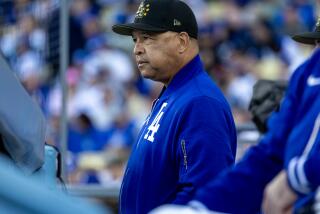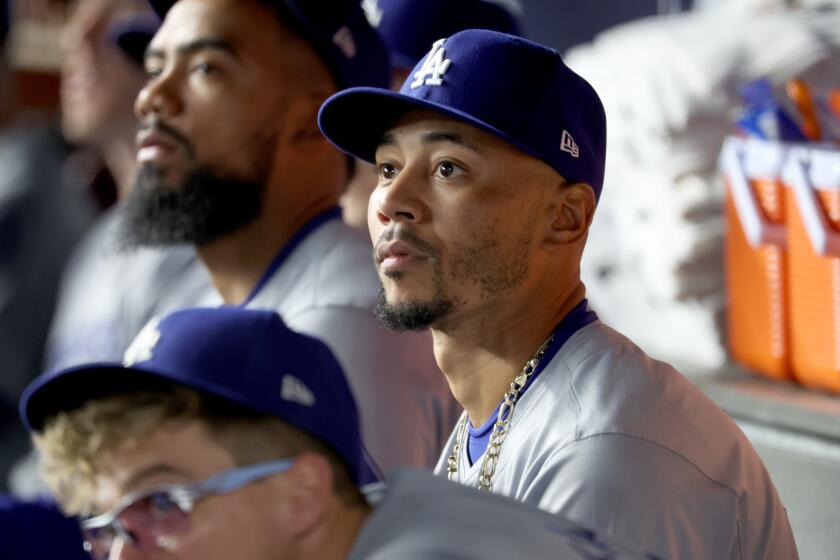Giants allegedly missed signs
If the Dodgers were portrayed as nonchalant regarding steroids in former Sen. George Mitchell’s report on performance-enhancing drugs in baseball that was released Thursday, the San Francisco Giants were shown to be downright negligent, dismissing obvious signs of trouble and unwilling to challenge home run king Barry Bonds.
Giants General Manager Brian Sabean was depicted in the most unfavorable of lights, as the report detailed how he ignored repeated warnings from then-trainer Stan Conte about Bonds’ entourage, which included his personal trainer Greg Anderson.
Conte became the Dodgers’ trainer last season.
The report also verified Anderson’s previously reported claim that he knew in advance when Bonds, who allegedly used steroids, would be drug tested during the 2003 season. Bonds, who broke the all-time home run record last season, is facing federal perjury charges stemming from grand-jury testimony about his alleged drug use
“I’ll know like a week in advance or two weeks in advance before they’re going to do it,” Anderson said in a secretly recorded conversation published by the San Francisco Chronicle. “But it’s going to be either at the end of May or the beginning of June, right before the All-Star break definitely.”
Mitchell’s investigators obtained records from the contractor administered to perform the tests that showed Bonds was tested on May 28 and June 4 of that year. The source of the leak could not be identified.
One incident involving the Giants that was chronicled in the 409-page report took place in August 2002, when Sabean did little upon hearing from Conte that Anderson might be distributing steroids to Giants players.
According to a passage in the report based on Conte’s interviews with Mitchell investigators, Conte was approached by a Giants player who told him he was considering obtaining steroids from Anderson. Conte said he lectured the player on the health risks and unfairness of steroid use and reported the incident to Sabean within an hour. Conte didn’t identify the player to Sabean that day, the report said, or later to Mitchell investigators, citing trainer privilege.
Sabean said he didn’t report the incident to the commissioner’s office because he was unaware of the league policy requiring him to disclose information about a player’s drug use. He said that he also didn’t want to risk exposing Conte as a clubhouse informant.
Conte admitted Thursday that he was interviewed twice by Mitchell’s investigators, in November 2006 and summer 2007.
“I think the Mitchell report did as well as could be expected to report the facts in regards to the portion of the report that pertained to me,” Conte said. “I felt it was true and accurate.”
A call to Sabean on Friday was not returned.
Sabean’s assistant at the time was Ned Colletti, now the Dodgers’ general manager. Dodgers officials weren’t commenting on the Mitchell Report on Friday, but sources familiar with the Giants in that period said Colletti had no knowledge of the conversations between Sabean and Conte.
A Giants spokesperson referred inquires regarding the Mitchell Report to a written statement by owner Peter McGowan, which in part read, “The Giants accept our fair share of responsibility. Our entire organization, from front office to field staff, pledges to work closely with Commissioner [Bud] Selig and Senator Mitchell to implement the Report’s recommendations and to institute whatever reforms are necessary to restore confidence in the integrity of the game.”
McGowan, according to Mitchell’s report, recanted a statement he made to Mitchell about Bonds telling him in February 2004 that he had taken substances that he later learned were steroids. McGowan’s lawyer called a Mitchell investigator two days later, saying that his client misspoke.
McGowan said he asked Sabean in 2003 if Anderson was distributing steroids in the Giants’ clubhouse, the report said, and Sabean “responded that he was not aware of any problem the Giants might have.” Sabean “strongly denied” that the conversation ever took place.
According to the report, Conte had complained to Sabean as far back as spring training in 2000 about Anderson and Harvey Shields, another of Bonds’ personal trainers. Conte viewed Anderson and Shields as unqualified -- when asked by Conte for a resume, Anderson provided him with a one-page document indicating he was a high school graduate -- and didn’t think they should be allowed in the clubhouse, weight room or other restricted areas. Sabean told Conte that he should order them out if he felt that way, the report said, but didn’t respond when asked by Conte if he would support him if Bonds complained.
Sabean told Mitchell investigators that he didn’t recall this particular conversation with Conte.
But Conte was portrayed as negligent at the end of the 2003 season, when Giants clubhouse attendant Mike Murphy found a sealed package of syringes when cleaning out catcher Benito Santiago’s locker. Murphy took the syringes to Conte, who never reported the matter to the Giants or the commissioner’s office.
The report said Conte and assistant trainer Dave Groeschner didn’t report the incident because Santiago was a free agent.
Anderson told federal investigators that Santiago was his client.
--
More to Read
Are you a true-blue fan?
Get our Dodgers Dugout newsletter for insights, news and much more.
You may occasionally receive promotional content from the Los Angeles Times.










